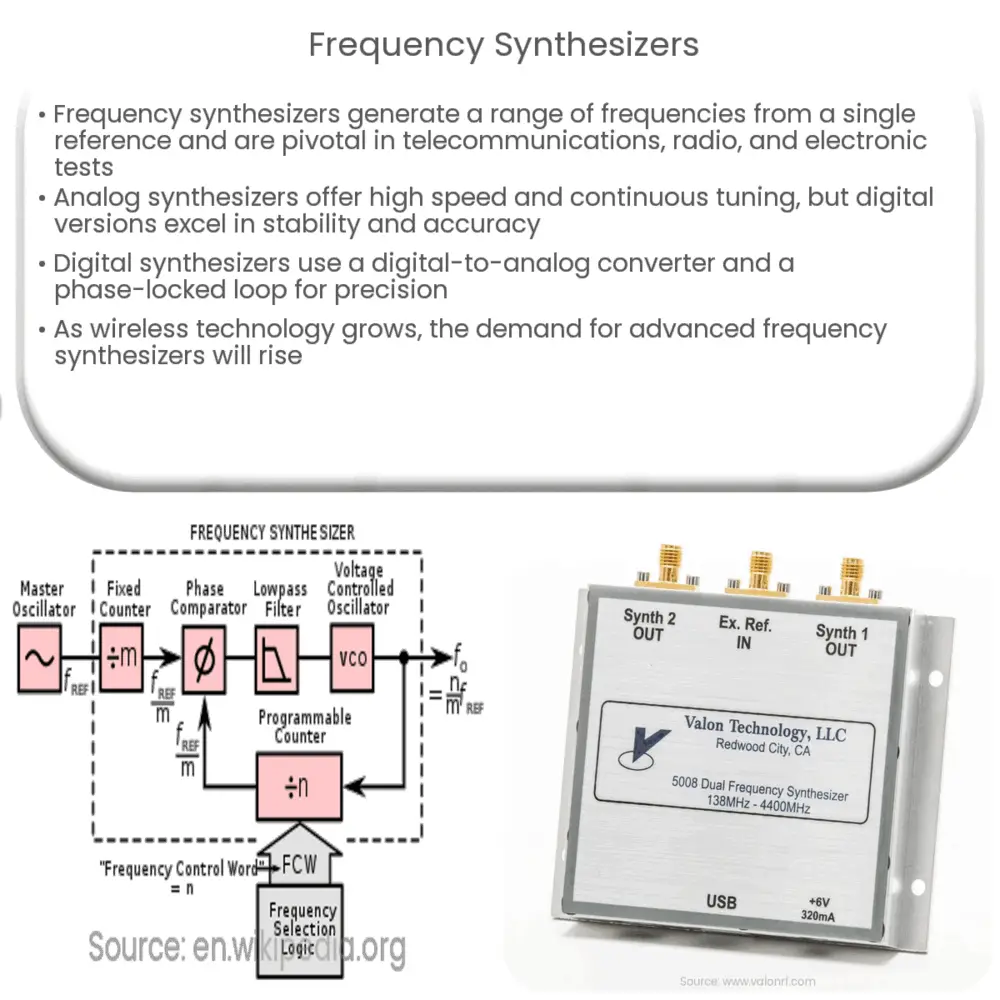Explore the workings of frequency synthesizers, their types, applications, and importance in telecommunications and electronics.

Introduction to Frequency Synthesizers
A frequency synthesizer is a device that generates a range of frequencies from a single reference frequency. It is used extensively in a variety of applications, such as telecommunications, radio broadcast systems, and electronic test equipment, to mention a few.
The Principle of Operation
The core principle of a frequency synthesizer lies in the use of a frequency multiplier and divider circuit. This circuit is capable of generating a wide range of frequencies from a single, stable reference frequency. There are two major types of synthesizers: analog and digital. Each type uses a different method to achieve frequency multiplication and division, leading to unique advantages and trade-offs.
Analog Frequency Synthesizers
Analog frequency synthesizers use a voltage-controlled oscillator (VCO) to generate a range of frequencies. The VCO’s frequency output is controlled by the voltage input, and the output frequency can vary linearly or exponentially based on the voltage applied. As a result, analog frequency synthesizers have the advantage of providing continuous frequency tuning and higher speed.
- Pros: high speed, continuous tuning capability.
- Cons: less stability and accuracy compared to digital frequency synthesizers.
Digital Frequency Synthesizers
On the other hand, digital frequency synthesizers use a digital-to-analog converter (DAC) to convert digital frequency values to analog signals. A key component of a digital synthesizer is the phase-locked loop (PLL), a control system that generates an output signal whose phase is related to the phase of an input signal. This technology allows for precise control over the generated frequencies, leading to high stability and accuracy.
- 1Pro: stability and accuracy are superior to analog synthesizers.
- 2Con: may lack the continuous tuning capability of analog synthesizers.
Regardless of the type, frequency synthesizers play a crucial role in today’s technological landscape, enabling a myriad of electronic and communication devices to function optimally. They are foundational to our digital age.
Applications of Frequency Synthesizers
Frequency synthesizers are an essential component in numerous electronic systems and devices. Let’s explore some of the key applications where they are employed:
- Telecommunications: In modern communication systems, frequency synthesizers are used to generate the carrier frequencies required for signal transmission and reception. They allow for rapid switching between channels and can help maintain precise frequency standards.
- Radio Broadcasting: In radio systems, frequency synthesizers are used to generate accurate carrier frequencies for both transmission and reception. This results in clear, high-quality signal broadcasting.
- Test and Measurement Equipment: Frequency synthesizers are extensively used in electronic test equipment like signal generators, frequency counters, and spectrum analyzers. These devices require a range of frequencies to test and analyze different types of electronic devices and systems.
The Future of Frequency Synthesizers
Looking towards the future, the demand for frequency synthesizers is projected to grow with the advancement of wireless technologies. The increasing reliance on precise frequency control for applications such as 5G telecommunications, radar systems, and satellite communications drives this demand. Innovations in synthesizer design aim to increase the speed, accuracy, and stability of these devices while reducing their size and power consumption.
Conclusion
In conclusion, frequency synthesizers play an indispensable role in our increasingly interconnected and technologically advanced world. They serve as a fundamental component in a wide variety of electronic and communication systems, facilitating everything from mobile phone communication to radio broadcasts to the operation of test and measurement equipment. As technology continues to advance, the importance of frequency synthesizers is only set to increase, making them an exciting field of study and development.

